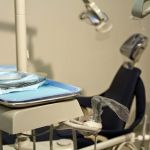How to Keep Your Smile Healthy as You Age
As we age, it's natural for our bodies to go through changes, and our oral health is no exception. Over the years, I’ve learned that maintaining a healthy smile is crucial not just for aesthetic reasons, but for our overall health. In this article, I’ll share practical advice, tips, and stories from my personal experience to help you keep your smile healthy as you grow older. Let's dive into the world of dental care, and explore how we can protect our teeth and gums at every stage of life.
1. The Importance of Regular Dental Checkups
One of the first things I realized as I grew older was the importance of visiting the dentist regularly. When I was younger, I never truly appreciated the need for frequent checkups, but now, I know that staying on top of dental visits is one of the best ways to maintain a healthy smile. Regular dental checkups allow your dentist to catch problems like cavities, gum disease, or oral cancer in their early stages—problems that are much easier to treat when caught early. I remember my dentist telling me once, “It’s much easier to prevent than to fix.” This advice has stayed with me over the years.
By scheduling dental exams every six months, you ensure that you’re staying proactive in your oral care. If you’re unsure when to go for your next checkup, consult with your dentist. They’ll guide you on the best frequency based on your personal oral health history.
2. How to Care for Your Gums as You Age
As we age, our gums become more vulnerable to infection and disease. I’ve noticed this myself—gum disease, also known as periodontal disease, is more common in older adults. It starts with gum inflammation (gingivitis) and can progress to more severe conditions if left untreated. The good news is that gum disease is preventable, and it starts with good oral hygiene practices. Brushing twice a day with fluoride toothpaste, flossing daily, and using an antibacterial mouthwash can help keep your gums healthy and free from harmful bacteria.
I’ve also found that paying extra attention to my gums during brushing helps. A soft-bristled toothbrush is gentle on the gums and helps to avoid any irritation. It’s easy to overlook gum health, but I’ve learned that maintaining healthy gums can prevent tooth loss later in life.
3. Strengthening Your Teeth with Diet and Nutrition
Your diet plays a huge role in the health of your teeth, and this is something I wish I had realized earlier in life. Over the years, I’ve learned that a balanced diet rich in vitamins and minerals can help maintain strong teeth. Calcium is especially important—it helps to strengthen enamel, the protective outer layer of your teeth. Dairy products like milk, yogurt, and cheese are great sources of calcium, but if you're lactose intolerant or prefer plant-based options, foods like almonds, leafy greens, and fortified plant milks can do the trick.
Additionally, vitamin D is essential for calcium absorption, so I make sure to spend some time in the sun each day and eat foods like fatty fish and egg yolks, which are rich in vitamin D.
4. Dealing with Dry Mouth
As we age, many of us experience dry mouth (xerostomia). This condition can make it harder to speak, swallow, and eat, and it can also increase the risk of cavities and gum disease. I started noticing dry mouth symptoms as I got older, and I discovered that it’s often a side effect of certain medications, dehydration, or health conditions. I found that drinking plenty of water, chewing sugar-free gum, and using saliva substitutes helped alleviate the discomfort.
Another great tip is using a humidifier in your bedroom at night. This helps to keep moisture in the air and can ease the symptoms of dry mouth. If dry mouth becomes persistent or severe, it’s important to talk to your dentist or doctor for further treatment options.
5. Protecting Your Smile with Proper Oral Hygiene
Proper oral hygiene is the foundation of a healthy smile, and it’s never too late to start practicing good habits. I make it a point to brush my teeth at least twice a day for two minutes each time. It might sound simple, but I’ve learned that proper brushing technique matters just as much as how often you brush. I use gentle, circular motions and make sure to brush all surfaces of my teeth—inside, outside, and chewing surfaces. I also take care to brush my tongue, which is a hotspot for bacteria.
Flossing is another habit that I never skip. Flossing helps to remove plaque and food particles from between your teeth where your toothbrush can’t reach. For me, it’s become part of my daily routine. I find it makes my mouth feel fresh and clean. If regular floss is too difficult to manage, there are other tools available, like floss picks or water flossers, which can make the process easier.
6. Whitening Your Teeth Without Harm
Who doesn’t want a bright, white smile? Over the years, I’ve tried various teeth-whitening methods, but I’ve learned the importance of doing it safely. As we age, our teeth naturally darken, and I noticed this happening to my own smile. While over-the-counter whitening products can provide a temporary solution, I found that professional whitening treatments from my dentist were more effective and safer. They can customize the whitening process to minimize sensitivity, which is something I’ve struggled with in the past.
If you prefer to avoid professional treatments, I recommend using a whitening toothpaste with fluoride. These toothpastes are effective at removing surface stains and can help maintain a bright smile without damaging your enamel.
7. Dealing with Tooth Sensitivity
Tooth sensitivity is another common issue that tends to worsen with age. Cold drinks, hot foods, or even brushing can sometimes cause a sharp, painful sensation. I’ve found that using a toothpaste specifically designed for sensitive teeth has helped reduce this discomfort. These toothpastes contain compounds that help block pain signals to the nerves in your teeth.
If sensitivity continues to be a problem, I recommend discussing it with your dentist. There are also treatments, such as fluoride varnishes or sealants, that can help protect exposed tooth roots and reduce sensitivity.
8. Embrace the Benefits of a Healthy Smile
At the end of the day, keeping your smile healthy as you age is all about consistency and good habits. I’ve come to realize that my oral health affects much more than just my teeth; it impacts my overall well-being, confidence, and even my quality of life. Whether I’m eating, talking, or laughing with friends and family, I feel more comfortable and confident knowing that I’m taking care of my smile.
So, if you’re reading this and wondering how you can keep your smile in top shape as you get older, remember: it’s never too late to start taking better care of your oral health. Small, consistent efforts today can lead to a lifetime of healthy smiles and better overall health. And if you need expert advice or professional dental care, don’t hesitate to visit us at Dentistry Toothtruth for the best recommendations for dental services tailored to your needs.







 Mid-Peninsula Dental Specialists5.0 (92 review)
Mid-Peninsula Dental Specialists5.0 (92 review) Happy Dental Land multi dental Specialty3.0 (58 review)
Happy Dental Land multi dental Specialty3.0 (58 review) Dentistry at Greenway4.0 (121 review)
Dentistry at Greenway4.0 (121 review) Midwest Dental - Eagan4.0 (150 review)
Midwest Dental - Eagan4.0 (150 review) Aspen Dental - Oswego, IL4.0 (176 review)
Aspen Dental - Oswego, IL4.0 (176 review) Samantha H Roach, DDS, MS5.0 (26 review)
Samantha H Roach, DDS, MS5.0 (26 review) The Importance of Oral Health Education During Pregnancy for a Healthy Pregnancy
The Importance of Oral Health Education During Pregnancy for a Healthy Pregnancy Best Tips for Brushing Your Teeth Properly for Healthy Gums: Essential Techniques for Oral Health
Best Tips for Brushing Your Teeth Properly for Healthy Gums: Essential Techniques for Oral Health Why Skipping Dental Checkups Can Lead to Bigger Oral Health Problems
Why Skipping Dental Checkups Can Lead to Bigger Oral Health Problems Advantages of Porcelain Dental Restorations
Advantages of Porcelain Dental Restorations How Can Diabetes Cause Tooth and Gum Problems? Preventing and Managing Oral Health Issues
How Can Diabetes Cause Tooth and Gum Problems? Preventing and Managing Oral Health Issues Healthy Habits for Promoting Good Oral Health and Hygiene: Tips for a Healthy Smile
Healthy Habits for Promoting Good Oral Health and Hygiene: Tips for a Healthy Smile